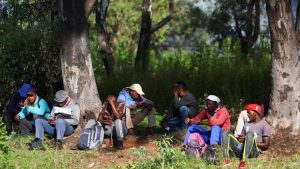Thousands of Grade 7 and 12 learners in KwaZulu-Natal, dressed in school uniforms and wearing masks, have reported to school after a two-month break due to the coronavirus lockdown. But at some schools in the province teaching and learning have not yet resumed due to various challenges including schools without water.
Colourful school uniforms, as well as the morning rush hour of parents dropping their children off, are back on the streets in KwaZulu-Natal as schools reopened for Grades 12 and 7 learners.
At some schools in Umlazi and Pinetown, educators were on hand to ensure all learners entering school premises had masks on.
Grade 12 learners at Menzi High School kicked off the first period on time.
But it was a different picture at Inselele Primary School where parents prevented learners from going to their classes, accusing the principal of not involving the School Governing Body in cleaning the school last week.
#sabcnews #sabckzn #SchoolReopening #COVIDSchools Parents at Inselele Primary school are NOT allowing learners to enter school premises, they are not happy how the Principal allegedly cleaned the school to ensure safety of learners. SGB says they were not involved. pic.twitter.com/homlD0mldv
— Nonkululeko Hlophe (@Leko3) June 8, 2020
Parents are calling for the Provincial Department of Education to intervene. Several schools in the area also referred to an alleged department circular, barring educators from engaging with the media on how the reopening was progressing.
Inselele Primary School SGB Chairperson, Solomon Mkhungo, says they are unable to ensure the safety of learners.
“The problem is the principal never followed the process to involve SGB. She decided to clean the school on her own alone using the school cleaning staff. As the SGB, we have no knowledge of how the process unfolded and we are not sure of the safety of our kids,” says Mkhungo.
KwaZulu-Natal Education MEC, Kwazi Mshengu, has visited some schools to monitor the reopening of the schools.
He says learners from schools without access to clean water, will be transported to nearby schools until the situation is rectified.
Mshengu says about 104 schools are affected by a lack of water.
“With the re-enforcement of the South African National Defence Force as well as Rand Water. We are increasing our capacity to send water into those schools because the challenge has been the capacity of the municipality that could not service the communities and our schools, in the manner which we have planned as the Department of Education. By the end of the week, we should have completed everything but in the meantime, the learners from those schools are being transported into nearby schools so that they do not get left behind in terms of recovery,” says Mshengu.
In this video below, KZN learners return to school:
The KwaZulu-Natal Education Department says investigations are ongoing into the disappearance of Personnel Protection Equipment in three districts last week.
Mshengu says the affected areas are Zululand, Pinetown and Umlazi.
In Zululand, district officials discovered thousands of the missing masks in a second storage facility.
Mshengu says the investigation must look at possible irregularities that led to the incident.
“We have taken a posture to say they must go and explain themselves in the investigation because we were almost made to incur additional costs when actually things were delivered. We don’t want to be seen to be putting things under the carpet. We were asking even ourselves what if we didn’t announce this investigation would these masks have resurfaced or what would have been the case?” questions Mshengu.
Meanwhile, the National Teachers Union (Natu) says the schools that were vandalised have not yet been repaired. Natu President Allen Thompson says the issue of screening is has been adopted by the Health Department.
While learners adapt to wearing masks and practicing social distance, behind the scenes a series of meetings are being conducted by on how to save the academic year.
Mixed reactions
There have been mixed reactions as schools reopened on Monday. Grades 7 and 12 have resumed classes on Monday in a number of schools across the country, however, some schools remain shut due to challenges including PPE’s, water, sanitation, and infrastructure.
The General Secretary for the National Association of School Governing Bodies, Matakanye Matakanya explains:






